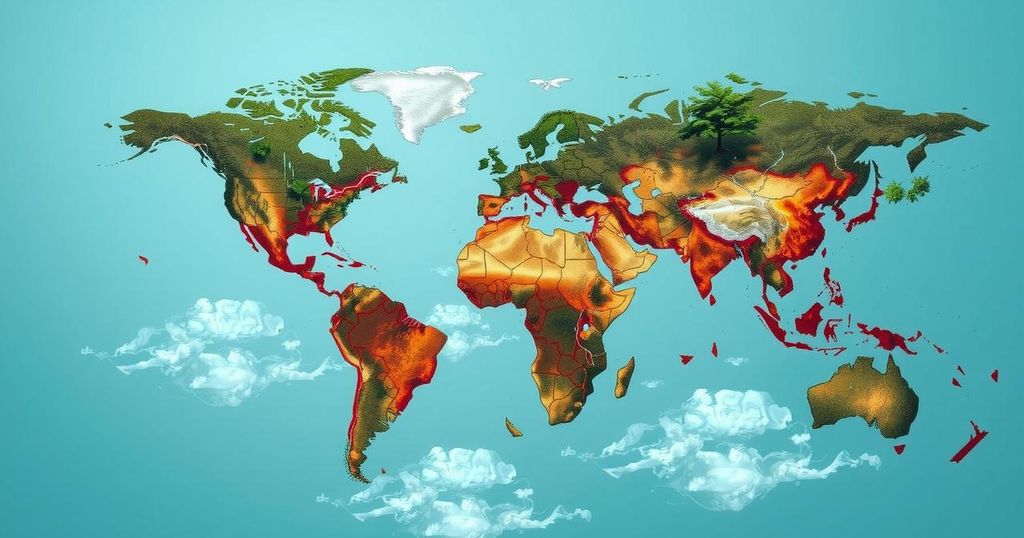Rewind 2024: A Call to Action Amidst Escalating Climate Change Challenges
In 2024, climate change effects were starkly evident with record temperatures and deadly natural disasters resulting in significant casualties worldwide. The urgency for action has never been greater as the rise in global temperatures threatens ecological stability. Comprehensive measures including transitioning to renewable energy and reducing emissions are essential, necessitating cooperation at all levels of society.
The year 2024 serves as a pivotal reminder for governments, policymakers, and individuals regarding the urgent nature of climate change. This phenomenon signifies a significant alteration in global weather patterns and temperatures, predominantly driven by human activities such as fossil fuel combustion since the 1800s. Alarmingly, the Earth’s surface temperature has risen by approximately 1.2 degrees Celsius, with the United Nations cautioning that maintaining a rise of no more than 1.5 degrees Celsius is critical to preventing disastrous environmental consequences. Yet, current trajectories suggest potential increases of up to 3.1 degrees Celsius by the century’s end.
In 2024, the world witnessed catastrophic natural disasters exacerbated by climate change, including an alarming number of heatwaves, hurricanes, and floods that resulted in significant casualties and economic damage. The Atlantic hurricane season alone reported 18 named storms, with major hurricanes resulting in hundreds of fatalities and significant destruction. Regions such as Southern Brazil, Papua New Guinea, and parts of South Asia experienced devastating flooding and landslides as a direct consequence of extreme weather, leading to the loss of lives and homes.
Heatwaves further compounded the crisis, with unprecedented global temperatures claiming thousands of lives, especially in Asian countries suffering from extreme heat conditions. Data indicated that countries in Southeast Asia faced severe heat-related casualties, while record-breaking temperatures were noted across continents. Reports from various organizations highlight a pressing need for immediate action against the escalating impacts of climate change, which manifest not only through direct weather events but also as untreated illnesses linked to environmental degradation.
The alarming statistics around these weather disasters serve as a wake-up call underscoring the necessity for global cooperation in addressing climate challenges. Governments must prioritize transitioning to renewable energy sources and significantly reducing greenhouse gas emissions to avert further crises. Despite the necessity for substantial investments, the lack of action may render our planet unsuitable for future generations.
The importance of our individual actions cannot be overstated; every effort counts in the battle against climate change, and it is crucial for every citizen to contribute positively. As we reflect on the events of 2024, it becomes evident that time is of the essence. Immediate sustainable practices and solutions are essential to secure a viable future for mankind on this planet.
Climate change remains one of the most formidable challenges faced globally, characterized by enduring shifts in weather patterns and increasing temperatures. While some changes occur through natural processes, the substantial evidence links human activities, particularly the combustion of fossil fuels, to accelerated climate change since the Industrial Revolution. The ongoing rise in surface temperatures poses significant threats to ecosystems, weather stability, and human health, necessitating a clear understanding of the mechanisms driving these changes for effective mitigation strategies.
In conclusion, the events of 2024 highlight the urgent need for immediate action against climate change as evidenced by the increasing frequency and severity of natural disasters and heatwaves leading to loss of life and economic challenges globally. Governments and individuals alike bear a responsibility to implement sustainable practices and support global initiatives aimed at reducing environmental impacts. Urgent adaptation and commitment to renewable resources are not merely options but necessities to ensure a habitable planet for future generations.
Original Source: www.wionews.com




Post Comment